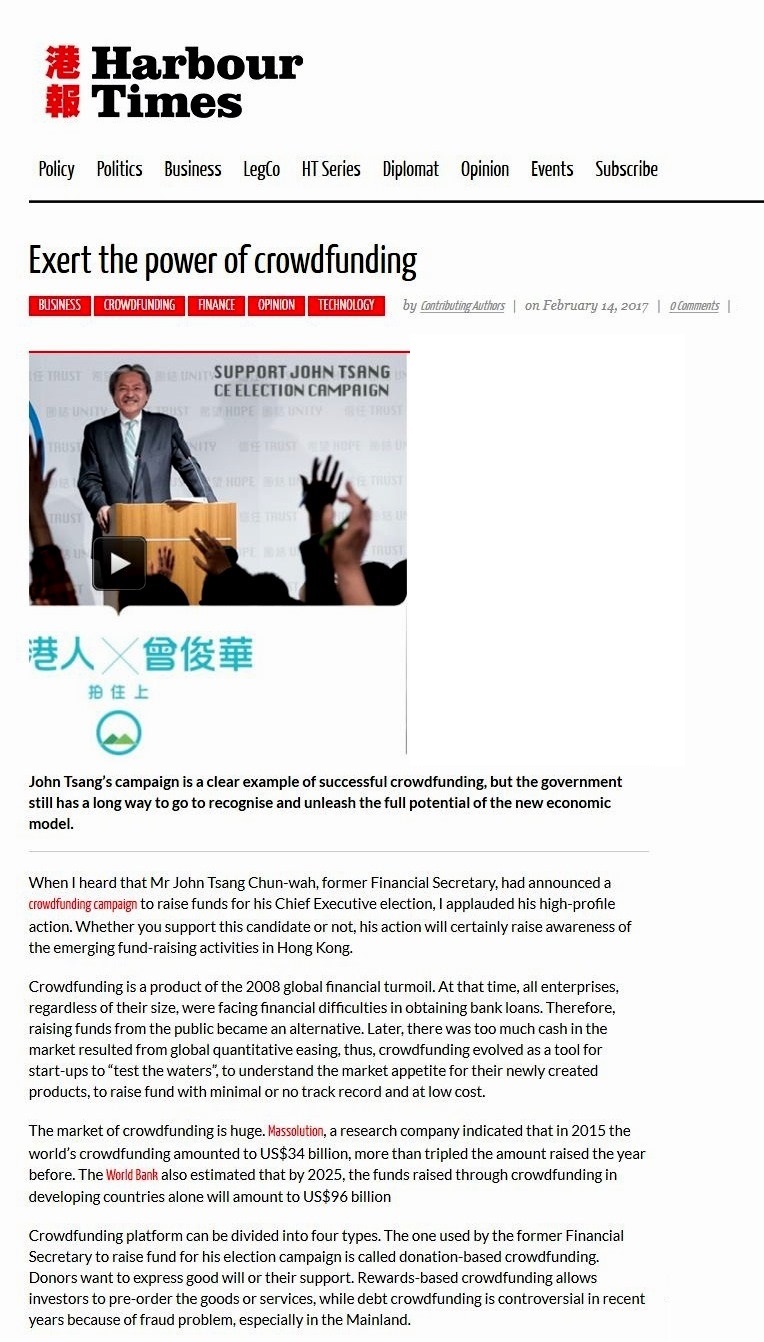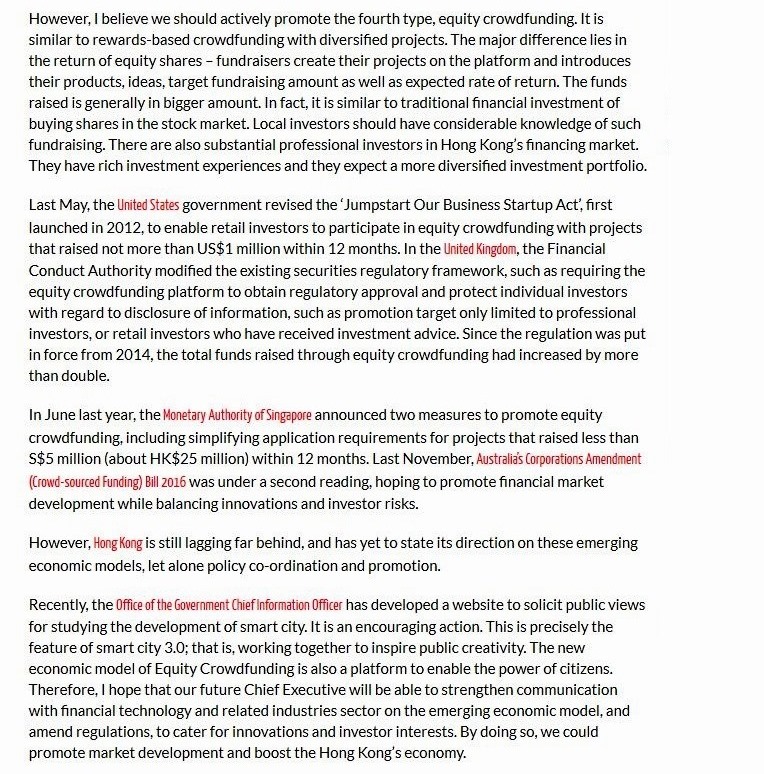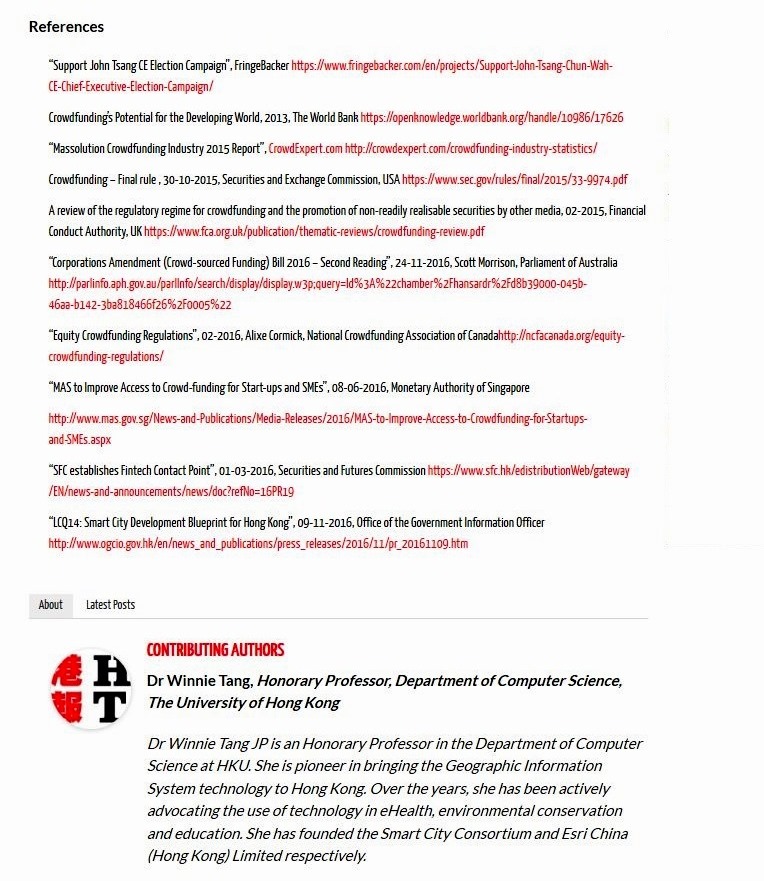網上版請按此



Exert the power of crowdfunding
When I heard that Mr John Tsang Chun-wah, former Financial Secretary, had announced a crowdfunding campaign to raise funds for his Chief Executive election, I applauded his high-profile action. Whether you support this candidate or not, his action will certainly raise awareness of the emerging fund-raising activities in Hong Kong.
Crowdfunding is a product of the 2008 global financial turmoil. At that time, all enterprises, regardless of their size, were facing financial difficulties in obtaining bank loans. Therefore, raising funds from the public became an alternative. Later, there was too much cash in the market resulted from global quantitative easing, thus, crowdfunding evolved as a tool for start-ups to "test the waters", to understand the market appetite for their newly created products, to raise fund with minimal or no track record and at low cost.
The market of crowdfunding is huge. Massolution, a research company indicated that in 2015 the world's crowdfunding amounted to US$34 billion, more than tripled the amount raised the year before. The World Bank also estimated that by 2025, the funds raised through crowdfunding in developing countries alone will amount to US$96 billion.
Crowdfunding platform can be divided into four types. The one used by the former Financial Secretary to raise fund for his election campaign is called donation-based crowdfunding. Donors want to express good will or their support. Rewards-based crowdfunding allows investors to pre-order the goods or services, while debt crowdfunding is controversial in recent years because of fraud problem, especially in the Mainland.
However, I believe we should actively promote the fourth type, equity crowdfunding. It is similar to rewards-based crowdfunding with diversified projects. The major difference lies in the return of equity shares – fundraisers create their projects on the platform and introduces their products, ideas, target fundraising amount as well as expected rate of return. The funds raised is generally in bigger amount. In fact, it is similar to traditional financial investment of buying shares in the stock market. Local investors should have considerable knowledge of such fundraising. There are also substantial professional investors in Hong Kong's financing market. They have rich investment experiences and they expect a more diversified investment portfolio.
Last May, the United States government revised the 'Jumpstart Our Business Startup Act', first launched in 2012, to enable retail investors to participate in equity crowdfunding with projects that raised not more than US$1 million within 12 months. In the United Kingdom, the Financial Conduct Authority modified the existing securities regulatory framework, such as requiring the equity crowdfunding platform to obtain regulatory approval and protect individual investors with regard to disclosure of information, such as promotion target only limited to professional investors, or retail investors who have received investment advice. Since the regulation was put in force from 2014, the total funds raised through equity crowdfunding had increased by more than double.
In June last year, the Monetary Authority of Singapore announced two measures to promote equity crowdfunding, including simplifying application requirements for projects that raised less than S$5 million (about HK$25 million) within 12 months. Last November, Australia's Corporations Amendment (Crowd-sourced Funding) Bill 2016 was under a second reading, hoping to promote financial market development while balancing innovations and investor risks.
However, Hong Kong is still lagging far behind, and has yet to state its direction on these emerging economic models, let alone policy co-ordination and promotion.
Recently, the Office of the Government Chief Information Officer has developed a website to solicit public views for studying the development of smart city. It is an encouraging action. This is precisely the feature of smart city 3.0; that is, working together to inspire public creativity. The new economic model of Equity Crowdfunding is also a platform to enable the power of citizens. Therefore, I hope that our future Chief Executive will be able to strengthen communication with financial technology and related industries sector on the emerging economic model, and amend regulations, to cater for innovations and investor interests. By doing so, we could promote market development and boost the Hong Kong's economy.
Dr. Winnie Tang
Honorary Professor, Department of Computer Science, The University of Hong Kong